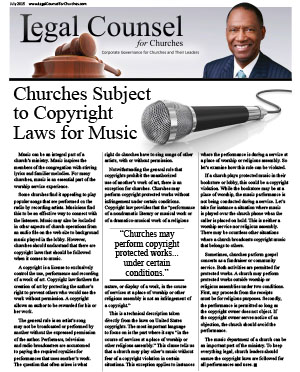Music can be an integral part of a church’s ministry. Music inspires the members of the congregation with stirring lyrics and familiar melodies. For many churches, music is an essential part of the worship service experience.
Some churches find it appealing to play popular songs that are performed on the radio by recording artists. Musicians find this to be an effective way to connect with the listeners. Music may also be included in other aspects of church operations from an audio file on the web site to background music played in the lobby. However, churches should understand that there are copyright laws that should be followed when it comes to music.
A copyright is a license to exclusively control the use, performance and recording of a work of art. Copyright law furthers the creation of art by protecting the author’s right to prevent others who would use the work without permission. A copyright allows an author to be rewarded for his or her work.
The general rule is an artist’s song may not be broadcasted or performed by another without the expressed permission of the author. Performers, television and radio broadcasters are accustomed to paying the required royalties for performances that uses another’s work. The question that often arises is what right do churches have to sing songs of other artists, with or without permission.
Notwithstanding the general rule that copyrights prohibit the unauthorized use of another’s work of art, there is an exception for churches. Churches may perform copyright protected works without infringement under certain conditions. Copyright law provides that the “performance of a nondramatic literary or musical work or of a dramatico-musical work of a religious nature, or display of a work, in the course of services at a place of worship or other religious assembly is not an infringement of a copyright.”
This is a technical description taken directly from the laws on United States copyrights. The most important language to focus on is the part where it says “in the course of services at a place of worship or other religious assembly.” This clause tells us that a church may play other’s music without fear of a copyright violation in certain situations. This exception applies to instances where the performance is during a service at a place of worship or religious assembly. So let’s examine how this rule can be violated.
If a church plays protected music in their bookstore or lobby, this could be a copyright violation. While the bookstore may be at a place of worship, the music performance is not being conducted during a service. Let’s take for instance a situation where music is played over the church phone when the caller is placed on hold. This is neither a worship service nor religious assembly. There may be countless other situations where a church broadcasts copyright music that belongs to others.
Sometimes, churches perform gospel concerts as a fundraiser or community service. Both activities are permitted for protected works. A church may perform protected works outside worship or religious assemblies under two conditions. First, any proceeds from the receipts must be for religious purposes. Secondly, the performance is permitted so long as the copyright owner does not object. If the copyright owner serves notice of an objection, the church should avoid the performance.
The music department of a church can be an important part of the ministry. To keep everything legal, church leaders should ensure the copyright laws are followed for all performances and uses.

